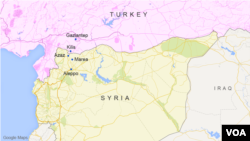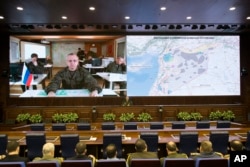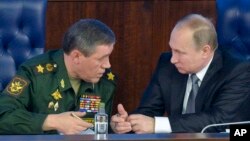An American military cargo plane dropped light weapons Thursday to rebels besieged by the Islamic State (IS) terror group in the northern Syrian town of Marea, the first resupply to them by the United States after weeks of appeals for help, according to local activists.
U.S. warplanes have also launched several airstrikes on IS positions in the countryside north of the city of Aleppo in a bid to help Marea’s defenders repel a concerted, weekslong effort by the jihadists to seize the town, a crucial one for insurgents fighting forces of President Bashar al-Assad in the Aleppo countryside.
On Friday, Colonel Pat Ryder, spokesman for U.S. Central Command, declined to provide details about the U.S. resupply missions, saying only that the U.S. provides weapons and ammunition to Syrian Arab counter-IS forces as they make progress.
However, Ryder denied reports from local activists that the U.S. airdrops included anti-tank weapons.
Pleas for more support
Rebels with the Free Syrian Army (FSA) have been appealing for weeks for U.S. assistance — complaining that the Kurdish-led Syrian Democratic Forces (SDF) benefit from close air support and arms supplies while they have been ignored and left on their own.
The battles for the towns of Azaz and Marea have flared and ebbed since February, but the IS push this time has been more determined — possibly to compensate for the recent loss of territory in Raqqa province to the U.S.-backed, Kurdish-dominated SDF.
The offensive amounts to the most significant advance near the Turkish border for IS in two years, said rebel commanders.
Marea and Azaz fell to opposition forces in 2012 and are vital stops along a rebel supply route from Turkey to districts the rebels hold in Aleppo, which the government has been trying to encircle for months.
Turkey has made several public appeals also in recent days on behalf of the besieged rebels. Last week, Turkey’s deputy chief of the Turkish general staff, Yasar Guler, urged U.S. counterparts to provide more support to the FSA.
IS headquarters targeted
Thursday’s strikes targeted IS headquarters, arms dumps and barracks in several villages, including Talalin, Hawr Nahr, Arshaf and Tel Malid.
“The U.S.-led strikes hit weapons storage centers and tactical units for IS in the northern countryside of Aleppo on Thursday evening,” Salih al-Zain, spokesman for Syrian opposition forces in Aleppo, told local news outlet ARA News.
He said four armored vehicles were destroyed in the bombing runs.
The air drop and airstrikes came as a former Russian minister disclosed that Russian President Vladimir Putin was weighing whether to deploy thousands of combat troops to Syria so his ally President Bashar al-Assad could pull off a “decisive victory.”
Andrei Fyodorov, a former deputy minister for foreign affairs, told Al Jazeera television in an interview that Putin was discussing with military commanders the possibility of deploying combat troops on the Syrian battlefield.
“This is under discussion; there are plans for this," the Kremlin insider said.
Russian invervention
Eight months ago, when Russia first intervened in Syria to prop up Assad with an air campaign — an intervention that changed dramatically the dynamics of the long-running conflict — Putin said he had no plans for a major ground operation in the war-wracked country. But he offered also the caveat “for now.”
Russian special forces commandos and some tank crews have been spotted on the battlefield since, but in small numbers — the vanguard for ground operations by the Assad regime has featured Iranian and Lebanese Shi’ite fighters as well as Iraqi and Afghan recruits.
A ground combat role for Russia would alter the dynamics of the conflict even more.
Recently, a former chief of staff of the Western-backed Free Syrian Army, Gen. Salim Idris, told VOA that the armed revolution against Assad couldn’t be won, but neither could the regime finish off the rebellion.
The only way the military stalemate could be ended, he argued, would be “if Russia does more.” Even then, he said, the rebels would most likely resort to an "underground war" of bombings and hit-and-run attacks.
The violent standoff between the regime and the rebels has in effect led to a de facto partition of the country and allowed jihadist groups such as the al-Qaida and Islamic State affiliate Jabhat al-Nusra to thrive.
Ground intervention a gamble
On the discussions in Moscow of a ground deployment, Fyodorov said: “This is a delicate issue for our military. There are serious doubts that any participation by Russia on the ground would be favorable. [Rather, it could] complicate the negotiation process and lead to further disagreements with the U.S.”
But he added that from the point of view of Russian military analysts, if Assad could seize back more territory, it could create the circumstances for elections — which Assad would win, he argued.
"That is why the issue of ground operations is becoming more actual,” he said.
A U.S. official told VOA that Russia does appear to be shifting some equipment from the area around Palmyra in what could be preparation for an offensive.
“You’re seeing some movement that could help them move towards Raqqa,” the official said, cautioning "nothing is imminent.”
Pressure rebel negotiators
Talk of a ground intervention by Russia is perhaps being raised now to put more pressure on rebel negotiators to concede an Assad role in a transition. If that is the reason for the airing now of a possible Russian troop deployment, it will most likely fail.
Rebel militias and opposition politicians have been adamant that Assad will have to go, insisting he can play no role in the future of the country.
Even if the negotiators did agree on a role for Assad, they would not be able to persuade rebel militias to lay down their arms, say political activists.








